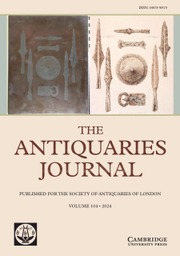No CrossRef data available.
Article contents
Papworth and his Ordinary
Published online by Cambridge University Press: 08 January 2012
Extract
It is by no means improbable that many standard works of reference owe their being to sheer exasperation of spirit. It is not, certainly, ascertained that there has ever been compiled any Dictionary of Bricklaying and Masonry, for example, by a working Cabinet Minister. But such an association of subject and author would not be more far-fetched than that of a quite well-known civil engineer in his day, Sir George Grove, and his even better-known Dictionary of Music; or of the medical man Peter Mark Roget and his verbal Thesaurus. The amateur, it may be supposed, hampered in the prosecution of one of his secondary interests by the lack of any comprehensively encyclopaedic work on it, must snatch time from his main calling in order to provide such an adjunct, though he might have counted on finding it ready done for him by experts. Papworth and his Ordinary of Arms offer a reasonably close parallel to those other cases. The practising architect would trench upon his scanty leisure to labour at an index of coat-armour—felt as indispensable as it was lacking to a fuller pursuit of his heraldic studies—because an adequate one done by specialists was not to hand.
- Type
- Research Article
- Information
- Copyright
- Copyright © The Society of Antiquaries of London 1942


